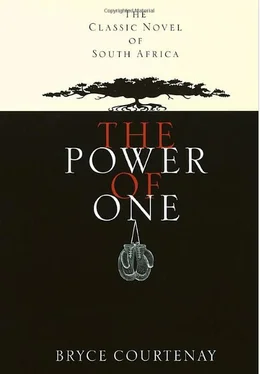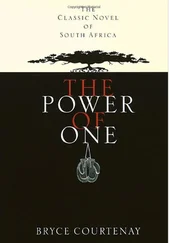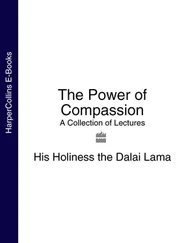Брайс Кортни - The Power of One
Здесь есть возможность читать онлайн «Брайс Кортни - The Power of One» весь текст электронной книги совершенно бесплатно (целиком полную версию без сокращений). В некоторых случаях можно слушать аудио, скачать через торрент в формате fb2 и присутствует краткое содержание. Жанр: Современная проза, на английском языке. Описание произведения, (предисловие) а так же отзывы посетителей доступны на портале библиотеки ЛибКат.
- Название:The Power of One
- Автор:
- Жанр:
- Год:неизвестен
- ISBN:нет данных
- Рейтинг книги:4 / 5. Голосов: 1
-
Избранное:Добавить в избранное
- Отзывы:
-
Ваша оценка:
- 80
- 1
- 2
- 3
- 4
- 5
The Power of One: краткое содержание, описание и аннотация
Предлагаем к чтению аннотацию, описание, краткое содержание или предисловие (зависит от того, что написал сам автор книги «The Power of One»). Если вы не нашли необходимую информацию о книге — напишите в комментариях, мы постараемся отыскать её.
The book is made to movie with the same name.
The Power of One — читать онлайн бесплатно полную книгу (весь текст) целиком
Ниже представлен текст книги, разбитый по страницам. Система сохранения места последней прочитанной страницы, позволяет с удобством читать онлайн бесплатно книгу «The Power of One», без необходимости каждый раз заново искать на чём Вы остановились. Поставьте закладку, и сможете в любой момент перейти на страницу, на которой закончили чтение.
Интервал:
Закладка:
By the time we had reached form three, the younger boxers were beginning to win on a regular basis and Atherton and Cunning-Spider had each won six of their last seven fights, Atherton as a lightweight and Cunning-Spider as a light-welterweight. Hymie’s Wooden Spoon Goons were building a reputation and gaining a whole heap of respect from the Afrikaans schools. The Prince of Wales School was no longer a joke and the Boer War was often won by the English these days. That was the year we finally lost the wooden spoon and the faded green, red and dirty white ribbon was removed and replaced with the colours of another school. Hymie had achieved his first objective which he told the Wooden Spoon Goons was only, ‘A small pimple on the great hairy arse of my ambition for the gentlemen Christian boxers.’
In the three years it took to lose the wooden spoon, I earned an exaggerated reputation as a boxer amongst the Afrikaans schools on the Witwatersrand. I started to fill out and by the time I was fourteen I was fighting as a bantamweight. Every fight, at school or away, was attracting the people. A match a hundred miles by bus or train from the school would attract just as many Africans as one at home where the boxing bouts had been moved away from the gym to the school hall. Here the Africans were allowed to sit at the very back of the hall separated from the whites by a wide corridor. During the summer it was popular to have the boxing out of doors, usually with the ring set up on a rugby field. At these times the blacks would be allowed to watch the fights, even those held at the most racist Afrikaans schools, where they were kept well separated from the white spectators. It was at one of these out of town Afrikaans schools that I first heard the word ‘apartheid’ used to describe the place where the black spectators were allowed to sit and I have often since wondered if I had witnessed the first use of a word which would become universal as an expression of oppression.
The boxing matches at these outdoor venues usually started at six just as the sun was beginning to set and were all over by eight when it was still light enough on the highveld not to need lights over the ring. It was at another of these outdoor fights that we invented the famous ‘sun-blinder’. The Prince of Wales boxer simply used the ring so that his opponent could be turned to face into the setting sun which would momentarily blind him. The idea was to work an opponent round and then time a punch just as the hapless boxer moved into the direct line of the late afternoon sun. If a boxer was clever enough on his feet this simple expedient could be made to work half a dozen times during a fight, often earning the extra points required to get the decision. The gentlemen Christians had no compunction about doing this to their opponents, after all this was the Boer War and no quarter was given or expected. Hymie got the idea from a movie he had seen which showed how the Battle of Britain Spitfires had come out of the sun to pounce on unsuspecting German aircraft.
The people would watch the fights in silence until it was my turn to fight and then invariably a soft, almost imperceptible hum would begin, growing in volume and, in the African manner, always in perfect harmony. Then a leader would take up a chant which might go something like this: ‘He is the chief who comes in our dreamtime, the caster of spells and the bringer of wisdom.’
‘Onoshobishobi Ingelosi!’ the people would chorus in reply.
‘He can dance in the dew without leaving footprints and stalk the wind until it howls to be free.’
‘Onoshobishobi Ingelosi!’
‘His blows are like the summer thunder and his lightning strikes his foes!’
‘Onoshobishobi Ingelosi!’
‘For cunning he matches the thin moon and for wisdom the full, for is he not Lord of the dark and the light, the day and the night?’
‘Onoshobishobi Ingelosi! Onoshobishobi Ingelosi!’
‘He will win for the people, he will win for all the people, in all the tribes, the people are all his people!’
‘He will win, he will win, he will win for the people, Onoshobishobi Ingelosi! Onoshobishobi Ingelosi! Onoshobishobi Ingelosi!!’
Once the fight started there would not be a sound from the black spectators and after I had won the tall black man who had been present at my first fight in the school gym would raise his hand in the fisted salute. ‘Onoshobishobi Ingelosi!’ he would shout and the blacks would silently leave. I was later to hear that the absolute silence during a fight was so they could not be accused of barracking for me and in so doing incur the wrath of my opponent’s people and thus be banned from attending. In fact the absolute silence from the African stands was uncanny and made a contribution to unnerving my opponents.
Hymie was quick to realise the potential of the black audience and in return for admitting them to the boxing matches at the Prince of Wales School they were required to sing. This was thought no hardship, as most Africans love to sing and soon a tradition was born. Hymie also persuaded Darby White to move my fight up so that I was higher on the bill. This meant that the black audience would be able to stay as late as possible while still allowing them time to be home by nine o’clock curfew.
Parents and members of the public began to attend these summer evening fights and the Afrikaans schools were forced to do the same as us to attract white spectators. The fights became popular events, with the African singing a big drawcard leading, as it did, to what was soon regarded as the feature of the entertainment, the chant that preceded my bout.
It is an indication of the enormous dichotomy between white and black that for the first three years no white spectator bothered to ask for a translation of what was being said in the chants. People seemed intrigued by the fact that a small white boy had gathered a huge black following but they simply put this down to my skill as a boxer. The presumption of the white man knows no bounds in Africa. The full story would never come out but somewhere along the line the words Onoshobishobi Ingelosi were translated to mean Tadpole Angel.
The Tadpole Angel quickly became my fighting name among the whites and also, to my extreme mortification, with the kids in the Afrikaans schools. Translated into English it was a dumb name and my embarrassment increased when it was further modified by an anti-following of Afrikaners who referred to me as ‘little angel’ and even sometimes as ‘Mama’s little angel’.
Though not large in number, I was conscious of this very vocal group who, like the much larger group of blacks, attended every fight, but who came in the hope that Mama’s little angel, the Kaffirboetie , would come to a sticky end at the hands of one of their own kind.
By contrast, the people saw the name in only one light. I was fighting for them against the Boer. The tangible evidence of the enemy in the form of the dissident group of Afrikaners only served to increase their fervour. Their numbers multiplied each week and their chants grew more elaborate and beautiful. In fairness it must be said there were whites who were on my side, adult Afrikaners who loved to see me box and didn’t give a damn about my being a Rooinek.
The fact that I hadn’t been beaten wasn’t as big a deal as it may seem, there were several kids from other schools who enjoyed unblemished records.
My mind was permanently focussed on a single fixed point, the welterweight championship of the world. I thought about it so often, reaffirmed my determination so frequently, that hardly an hour of my life passed when it wasn’t in my thoughts. To lose a fight would be a backward step, a hair-line crack in my armour. The only way it was going to happen was for me to come up against a boxer who was a helluva lot better than me. Not just more talented but also a lot better trained.
Читать дальшеИнтервал:
Закладка:
Похожие книги на «The Power of One»
Представляем Вашему вниманию похожие книги на «The Power of One» списком для выбора. Мы отобрали схожую по названию и смыслу литературу в надежде предоставить читателям больше вариантов отыскать новые, интересные, ещё непрочитанные произведения.
Обсуждение, отзывы о книге «The Power of One» и просто собственные мнения читателей. Оставьте ваши комментарии, напишите, что Вы думаете о произведении, его смысле или главных героях. Укажите что конкретно понравилось, а что нет, и почему Вы так считаете.












